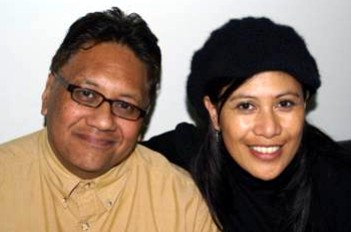
AUCKLAND (Pacific Media Watch): Members of the Polynesian Panthers Party have relived the heady days of the 1970s in a new documentary by Nevak 'Ilolahia, screened on Māori Television.
Polynesian Panthers covers some dramatic events from the era, including the infamous “dawn raids” and the protests at the final "all-white" Springboks rugby test in 1981 at Eden Park.
In the documentary, Nevak 'Ilolahia explores the origins of the Polynesian Panthers group with her uncle and group founder Will 'Ilolahia.
'Ilolahia and his friends were only in their early 20s when the group was founded and began a hardworking social justice campaign with youths who were gang members and “street people".
In footage of an interview with Will 'Ilolahia at the time, he said the young members actually stood for something and were going to start a "revolution" to combat the “oppression and racism that we suffer 24 hours a day".
Race Relations Commissioner Joris de Bres described the period as “severe political persecution".
The Polynesian Panthers were inspired by the American Black Panther Party and Huey Newton's ideas of black unity. The Black Panther policies were adapted to address the causes of Māori and Pacific Island oppression.
Memories of many New Zealanders would be of the violent conflict over the rugby protests, but the documentary shows is that much of the work of the Polynesian Panthers was peaceful and effective lobbying of the government to improve conditions of Pacific Islanders and their communities.
Community involvement
An example was the controversy over Franklin Road in the Auckland inner city suburb of Ponsonby, where two young boys had been killed as there was nowhere to cross the road at the intersection.
After unsuccessful lobbying of the Auckland City Council, the Panthers staged a peaceful demonstration on the site and in a short time traffic lights were installed.
The level of voluntary work and commitment earned the group significant status at the time and they were formed into a political party - the Polynesian Panthers Party, or PPP. With its own office space and a a place to meet and receive visitors who could come with issues and grievances, the Panthers' capabilities grew.
Remarkable efforts to help the young, poor and imprisoned members of the community were also highlighted. A community venture called “homework centres” was set up to ensure young students could come together after dinner time and be supervised and assisted in carrying out their school work. The Panthers volunteered their time to help out.
Another enterprise was to go to court houses and offer legal aid to unrepresented people convicted of offences.
'Ilolahia explains that “there was no reliable access to legal advice so the Panthers started their own legal aid programme".
Many of the offenders were those arrested through a special police task force that was set up to “clean up” the inner city.
'Ilolahia blames the perceived need of the task force on the media’s unfair depictions of violent and drunk Polynesians.
Will 'Ilolahia argues that the police would visit “places predominantly patronised by Pacific Islanders” and arrest them for “stupid petty little crimes".
An impressive part of the Panthers’ activities were the prison visits. Names of Polynesian prisoners who were seldom visited were given to the group so that they could arrange visitors to go and offer brotherly support.
Wedding night in prison
Musician Tigilau Ness was one of the founding members and recalls spending his wedding night visiting a prison.
Ness explained in the documentary that “we had work still to do".
“If we don’t turn up that’s the saddest thing on earth,” he said.
The Panthers’ responded to the "dawn raids" carried out on homes of Polynesians by staging their own raid against cabinet ministers.
Ness said the raids involved “waking people up with flashlights, demanding to see their identity and passports to make sure they were here legally and not over-stayers".
‘Illohaia explained: “So we decided to dawn raid the ministers.”
The Panthers staged dawn raids outside the houses of government ministers and demanded that they prove they were entitled to stay in the country.
“I had a friend who was working for Radio Hauraki at the time and he rang the minister on air asking him what was happening,” said 'Ilolahia.
“And he said, ‘How dare these people come at this ungodly hour'."
“That was the point. I think it took them two and a half weeks and there were no more dawn raids.”
Although the years of such blatant discrimination are over, 'Ilolahia finished with a stark reminder that Polynesians are “still among the poorest, least educated and most imprisoned in New Zealand society". - Pacific Media Watch



